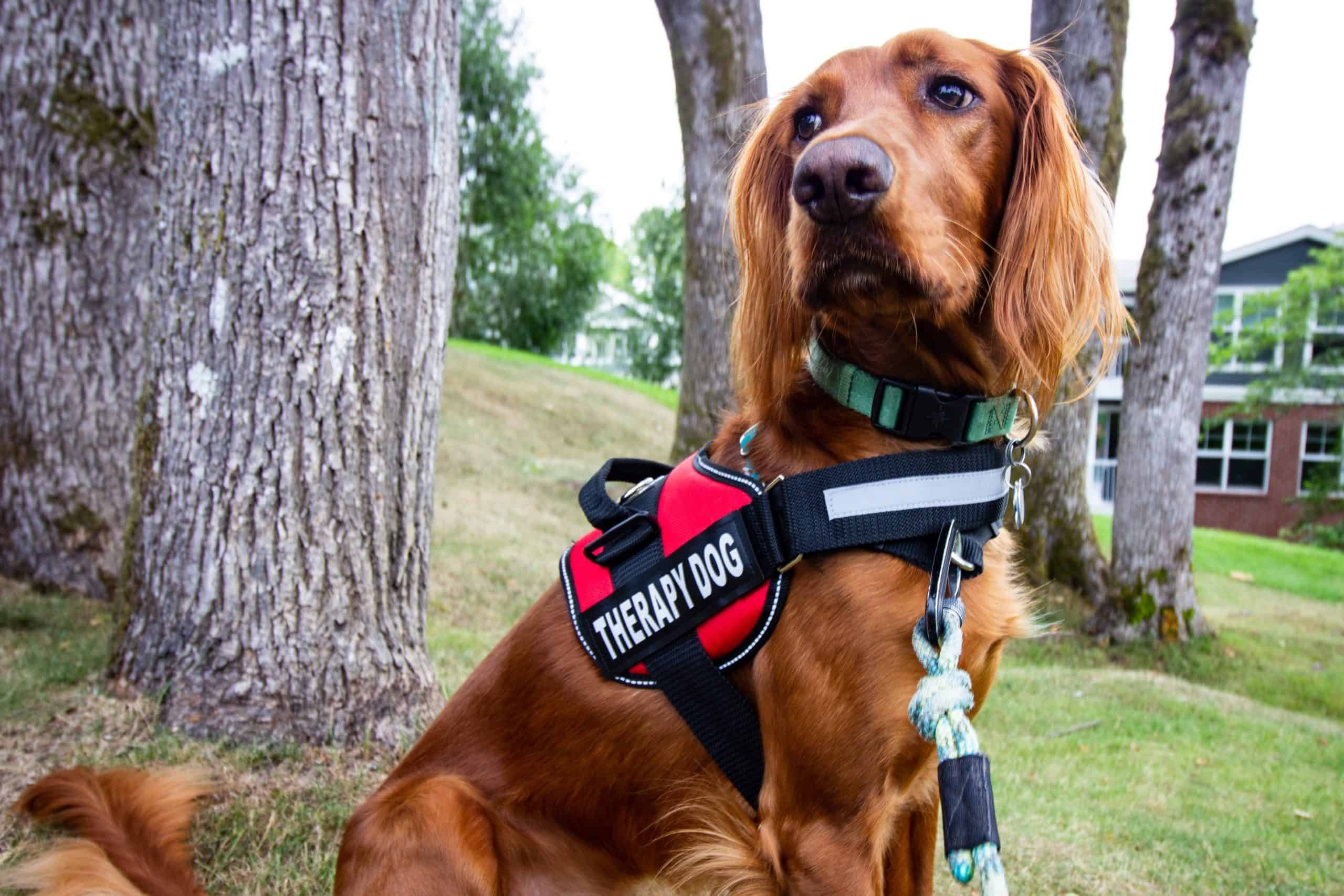Emotional Support Animals
YOU’RE ONE STEP CLOSER TO A NEW BEGINNING
Emotional Support Animals
Emotional support animals (ESAs) refer to dogs and other pets that provide emotional support and comfort to their owners on a daily basis. ESAs legally must be prescribed by a licensed mental health professional like a therapist, psychologist, or psychiatrist.
Emotional support animals differ from service dogs in a few key ways. Service dogs have been trained to perform specific tasks for individuals, and as such, as usually granted access to anywhere their owner goes. Emotional support animals do not require any specific training, although owners should make sure they’re well-trained in public. ESAs are not granted access to establishments such as restaurants or malls like service dogs are.
Individuals with ESAs are afforded some additional rights, such as the ability to live in otherwise non-pet-friendly housing under the Fair Housing Act. Additionally, the Air Carrier Access Act allows both service animals and ESAs to accompany their owners in the cabin of an aircraft during flights. Emotional support animals provide a valuable service to those who need it, but misrepresenting a pet as an ESA is both unethical and illegal in some states.
It is a criminal misdemeanor in Texas for anyone to make false claims stating that their animal is an assistance animal. Providing a letter, registry, or certificate to a person who is not disabled is a also a crime.
Emotional Support Animals Letters (ESA Letters)
An emotional support animal letter, or an ESA letter, is a document that qualifies people to be accompanied by a support animal in contexts in which pets might not be permitted, such as in rental housing or mass transportation. The letter must be issued by a psychiatrist, qualified mental health professional, or physician. The professional who issues an ESA letter need not be the recipient’s primary care physician, and some doctors may refer patients who are seeking an ESA to psychologists or other professionals.
Under US Department of Transportation, rules, the doctor or mental health professional who issues the letter must be currently providing treatment to the passenger. Airlines are not obligated to accept certificates or emotional support animals letters that are more than one year old, and may require that the certification be provided on the letterhead of a licensed mental health professional or doctor who is specifically treating the passenger’s mental or emotional disability.
Emotional support animals (ESA) owners are currently permitted to have their animals with them on commercial flights in the US, with the proper papers saying they are under the care.
Steps to getting emotional support animals
- Connect with a licensed mental health professional at Hopeful Texas, PLLC to determine if you would benefit from an ESA’s support
- Choose the type of animal to adopt, if you currently do not have a pet
- Train your ESA to be a good citizen
- Properly use your ESA letter
Step 1 – Contact Hopeful Texas to learn if you would potentially benefit from an emotional support animals (ESA) support
Emotional support animals are available to individuals that are suffering from a disability, which can be in the form of a mental illness or emotional distress condition. Pursuant to federal law, an emotional support animals recommendation letter must come from a licensed health care provider, but recognizing that you may have a condition that could benefit from professional help is always the first and most important step of addressing a potential mental or emotional illness.
There are a number of conditions recognized for which emotional support animals can be beneficial. These include Learning Disabilities, Attention Deficit Disorder (ADD), Anxiety Disorders, Depression, PTSD, and Phobias.
If you think you may be suffering from one of these conditions, or if you are unsure about what condition you may have but have been suffering ongoing mental or emotional distress, the next step is to reach out to a licensed professional for help. The therapists at Hopeful Texas can help you with this.
Step 2 – Adoption of Emotional Support Animals
If you already have a pet, that pet can serve as your ESA if you qualify for an ESA letter. If you do not have an ESA and are interested in adopting one, we recommend reaching out to your local animal shelter or rescue organization to find your perfect ESA. If you have your heart set on a specific breed that is hard to find in at a shelter or rescue, another option is to reach out to a responsible breeder.
Owning an ESA is a long-term commitment and choosing an ESA with the right temperament and attributes for your situation is important. Having a strong connection and bond with your emotional support animal can help make your ESA more effective in relieving the symptoms of your disability. It is also important to choose an animal with the right temperament. If you are dealing with depression or anxiety, the animal should bring you a sense of well-being and comfort in times of stress.
Step 3 – Training of Emotional Support Animals
One important thing to note about emotional support animals (ESA) is that they do not technically require special training. This is a common point of confusion that people have about ESAs. ESAs are different from service dogs, which have greater public access rights under different laws. Service dogs must be trained to perform specific tasks for the disabled – for example, a dog that guides a blind handler. On the other hand, ESAs do not need any special training – they provide support and comfort through their companionship for people with mental illnesses and emotional distress.
Even though your ESA does not need special training related to a disability, it is important that your ESA, like all pets, be given basic training to ensure he or she behaves appropriately in all situations. ESA owners do not have to pay fees or deposits in connection with their ESA, but they are responsible for any damage caused by their ESA to property. In addition, landlords and airlines can reject an ESA if it is unruly and the landlord or airline determines the ESA could harm others or create a safety issue.
Another important reason to have a well-behaved ESA is that each ESA owner is an ambassador for all ESA owners. It helps all ESA owners when your ESA can demonstrate that it is a model citizen to your landlord, neighbors, flight staff and fellow passengers.
Step 4 – Properly Use Your ESA Letter
If your licensed health care provider has determined an Emotional Support Animal (ESA) would benefit you and has given you an ESA letter, it is now important to understand how to use your ESA letter. For housing accommodation, you should submit your ESA letter to your landlord and let them know you are requesting reasonable accommodations for your emotional support animal pursuant to Fair Housing rules. Your landlord will have 10 days to respond to your request, and can only deny you in limited circumstances such as if the ESA poses a danger to others.
For air travel, you should submit your ESA request to the airline at least 48 hours before your departure. Each airline will have its own requirements and may have special forms that need to be completed for ESA accommodation. We recommend reaching out to the airline as soon as possible to ensure you have enough time to gather all of the paperwork you will need.
Sometimes landlords will demand to see a certification or registration for emotional support animals. These landlords are misinformed or unaware of actual ESA regulations. Certifications and registrations do absolutely nothing to legitimately qualify an ESA. The Department of Housing has actually warned tenants against using sites that sell certificates, registration numbers or licenses for emotional support animals.
The only way to qualify emotional support animals for purposes of Fair Housing law and the Air Carrier Access Act is to obtain a letter from a licensed health care professional. Some people use the term “certification” interchangeably with obtaining an ESA letter, but there is an important distinction between those two concepts – one will validly qualify your ESA, and the other will not.
Once your landlord grants your request for accommodation of your ESA, your ESA can live in your residence even if the building, HOA or co-op has a no-pets policy. The housing provider cannot impose breed and weight restrictions, and cannot charge fees or deposits relating to the ESA. If your landlord had previously charged a deposit for your pet which later qualified to become an ESA, you may be entitled to a refund of that deposit.
American Kennel Club
Everything You Need to Know About Emotional Support Animals
National Service Animal Registry
ESA Registration and Your Rights
Getting Started is Easy
Give us a call today for a free 20 minute consultation by a Houston therapist. We would be happy to answer any questions you may have. When you are ready, you can schedule your counseling / therapy appointment online. Be sure to ask about our secure online video therapy services. We offer online therapy & online counseling to patients all across Texas, Oklahoma, and Alabama.





